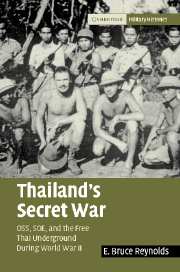Book contents
- Frontmatter
- Contents
- List of illustrations
- List of maps
- Preface
- Acknowledgments
- Notes on names and transliteration
- Prologue
- 1 The origins of the Free Thai movement
- 2 The China tangle
- 3 Chamkat and the Allies
- 4 Showdown in Friendship Valley
- 5 Frustrated hopes
- 6 Contact at last
- 7 The OSS commits to Pridi
- 8 Pridi's bid for national redemption
- 9 Arming and training the underground
- 10 The end game
- Epilogue
- Bibliography
- Index
8 - Pridi's bid for national redemption
Published online by Cambridge University Press: 28 July 2009
- Frontmatter
- Contents
- List of illustrations
- List of maps
- Preface
- Acknowledgments
- Notes on names and transliteration
- Prologue
- 1 The origins of the Free Thai movement
- 2 The China tangle
- 3 Chamkat and the Allies
- 4 Showdown in Friendship Valley
- 5 Frustrated hopes
- 6 Contact at last
- 7 The OSS commits to Pridi
- 8 Pridi's bid for national redemption
- 9 Arming and training the underground
- 10 The end game
- Epilogue
- Bibliography
- Index
Summary
As it became increasingly clear during the first five months of 1945 that the Axis Powers were doomed to defeat, Regent Pridi Phanomyong struggled to find a means to salvage his country's independence and prestige. Although he had established regular contacts with the Allies, London's negative attitude repeatedly frustrated his efforts to obtain a guarantee concerning Thailand's postwar status. The Americans had adopted a much more favorable stance and made no secret of their suspicions of the motives of their empire-minded “cousins,” yet Washington officials had been unable to convince the British to modify their policy and had shown limited willingness to press the issue. With the British controlling the regional Allied command, their troops would be the ones to invade or occupy Thailand. The British were also preparing to restore colonial rule in neighboring Malaya and Burma, so Pridi had little reason to expect that American support would be any more effectual in modifying British policy in the future than it had been to date. The Chinese, meanwhile, had their own agenda and might attempt to occupy part of Thailand. Under such circumstances, Pridi sought the best possible relations with each of the three Allied states, while simultaneously trying to gain whatever advantage he could by playing one against the other.
Pridi faced equally complex challenges on the home front. His relations with Police General Adun Adundetcharat and high-ranking army officers remained uneasy at best.
- Type
- Chapter
- Information
- Thailand's Secret WarOSS, SOE and the Free Thai Underground During World War II, pp. 287 - 331Publisher: Cambridge University PressPrint publication year: 2005

